|

Otto Wöhler, former director of INIDEP and specialist researcher in southern species. Photo: Diego Izquierdo / Revista Puerto/ FIS
Fishing at Mile 201: ´The thing is not to sit still´
 ARGENTINA
ARGENTINA
Friday, April 07, 2023, 01:10 (GMT + 9)
The researcher and former director of INIDEP, Otto Wöhler, a specialist in southern species, talks about the ecosystemic and economic impact of IUU fishing in international waters, the tools Argentina has to regulate it, and everything that could be being done and not it does.

Source: Oceana
Otto Wöhler was Director of Research at INIDEP and was in charge of its management until 2015. Later, under the management of Carlos Liberman, Oscar Padín was appointed and Wöhler returned to the Southern Species Program, this time not as project manager but as a researcher . Despite the fact that the current management of the institute does not allow him to speak to the media, nor to the University, about fishing at Mile 201, he does so in his personal capacity and not as an INIDEP researcher, without commenting on it. In the interview we talked about the implications that fishing in international waters has for our country, the tools that Argentina already has to regulate it and the ones it will have when the agreements to remove subsidies from the World Trade Organization come into effect. and that of Oceans of the UN, also on the risk of advancing with the MPA Agujero Azul. Everything from the perspective of a biologist, specialized in the species that inhabit that area and who has been part of the most prestigious discussion forums.
REVISTA PUERTO: What can the Oceans Agreement mean for Argentina?
OTTO WOLHER: In principle, it is positive to order some situations that occur on the high seas, beyond what affects us. The treatment of genetic resources is an issue that until now has had a relative importance in our country, but it comes to regulate a situation that was envisioned as conflictive in the medium term. On the one hand, Marine Protected Areas also seem positive to me, but you have to take it with a grain of salt; They are not the solution to a fishing problem. An MPA must be taken into account as a matter of conservation of an ecosystem as a whole; I am not saying that it cannot be used to regulate fishing, but it is not its objective and the problem that we have at Mile 200 is a conservation problem, but the main problem, clearly, is fishing management.
RP: Wouldn't they work?
OW: The area can be protected, but it is not an established tool for that, the tool is fisheries management; It could be with an AMP with a management plan that allows some activity, but it is complicated. It's not the most direct tool to address the issue. The new ocean treaty avoids talking about fishing, but talks about the conservation of biodiversity, which is closely related to fishing, it can regulate it without saying so explicitly and one of the ways is through environmental impact studies. However, in my opinion they fall a bit short, because whoever carries out the activity is the one who has to establish the environmental impact study.
RP: As in the oil industry in Argentina, should the environmental impact studies be carried out by the actors themselves?
OW: Yes, it is a question of self-control that until now has not existed, if not, we would not have the problem that we have at Mile 200. It falls on each one to control themselves and carry out a serious, forceful and realistic environmental impact study for above all things. It is going to be subject in some way to an evaluation by a team that would be created for this purpose, but it also does not establish what would happen if the impact study or the recommendations of that study are not complied with. It falls a little short in that regard, however, it's yet another tool to add, but I don't think it's the real solution to the problem either. Now, what we all ask ourselves is what happens with the Malvinas issue.

Source: Revista Puerto / Wiki / FIS
RP: It says that MPAs cannot be established in areas of disputed sovereignty.
OW: No, of course, that would not be accepted within the framework of this agreement and we know that the Agujero Azul MPA covers an underwater platform that has not been recognized by the UN, because it is an area also claimed by the United Kingdom as belonging to the platform of the islands As we have said on other occasions, there is an area there that will generate a huge conflict with fleets from third countries if the Agujero Azul MPA is established, because clearly Argentina does not have jurisdiction over the substance in that area.
RP: The article authored by you and García Moritán that proposes requiring permission from trawlers and longliners that operate on the extended maritime platform received some criticism in this regard. Several specialists consider that it would not be applicable to a large part of Mile 201 because we do not have jurisdiction.
OW: It is applicable in areas recognized by the UN. It is unregulated fishing, we do not know to what extent unreported and it is also partly illegal when fishing with trawlers in UN recognized areas. Our opinion is that fishing is illegal when it operates on the seabed in recognized areas, because a fishing permit is required that this fleet does not have, because these funds are property of the National State and when operating with bottom trawling it violates all the benthic, sessile fauna that is attached to these funds. Only 30 percent is not recognized by the UN, which is from the middle of the San Jorge Gulf to the south, towards the sector under the domain of the United Kingdom; in the rest it could be applied.
RP: It has been said that it would be difficult to apply. Is that true or do we have the tools to put it into practice immediately?
OW: In these cases it is not advisable to take everything from one day to the next and establish that the fishing is illegal and try to remove all the trawlers, but it is time to start talking about it and generate agreements. We have to move forward because we have the legal tool to do it, we should start talking to the countries that have fleets there and try to find a solution. The solution can range from the most radical, such as not allowing trawling by vessels that do not have an Argentine license until an agreement is reached to regulate this effort. What cannot be done is not regulate anything as it happens now. Fishing is free and it is the worst scenario. Approximately 50,000 tons of hake are being caught in that area, 4,000 tons of haddock, which is more than what is caught inland where it is heavily regulated; the catch of toothfish is also very significant.
RP: Since toothfish is so controlled worldwide, can't you file a claim?
.jpg) OW: Our proposal involves longline fishing in that area because it affects sedentary individuals and therefore it is also illegal. OW: Our proposal involves longline fishing in that area because it affects sedentary individuals and therefore it is also illegal.
RP: Is there no real awareness of the impact of that fleet?
OW: I don't know of a serious analysis of how much it affects Argentine fisheries. There isn't, I don't know why, but there isn't.
RP: Is there a way to measure it?
Photos: Stockfile FIS / Revista Puerto -->
OW: Yes, it can be measured because the captures are known, the effect can be modeled. But beyond the effect on the biological population, it has an effect on the commercialization of the products because it generates unfair competition. As for the ecosystem, there are already some signs that the seabeds are highly polluted by the effects of marine litter generated by three hundred and four hundred boats fishing there every year. That is an aspect that has not yet been addressed.
RP: With this legal tool of permits, with the WTO and UN agreements, what actions could Argentina be carrying out?
OW: With the issue of trawling it is very clear, you could establish that this fishing is illegal and sit down to chat with the countries that fish there. The WTO agreement is a very powerful tool because all the fleet that operates there is subsidized in one way or another, therefore, progress could be made as soon as it enters into force. It would be very useful to prepare a state of the art of high seas fishing for different resources and see what impact it has on ecosystems. Begin to investigate this so that when these agreements come into force, we can have a tool that conditions any environmental impact study that is intended to be carried out in the area and that does not conform to reality. These studies take time, it is a study on the ecosystem as a whole and all the fleets that operate there, because China can carry out an environmental impact study on its fleet, but it must consider the entire fleet that operates in the area and the effects cumulative. Argentina could be doing it to have him as comptroller, the situation warrants that this type of study be initiated.
RP: It is striking that the Foreign Ministry does not convene biologists to discuss this issue.
OW: Biologists alone would not be enough, the economic impact of this fishing is very important and it would be interesting to analyze with certain figures, because what is there is unsupported, it has not been shown how that figure was reached.
RP: Why doesn't Argentina react?
OW: It is a relatively new problem because it arises from the recognition of the extended platform and a political decision is necessary that is going to have consequences with countries with which Argentina markets many products, so I think that this generates some obstacles to taking measures. Those that operate by trawling are mainly Spain and some China, which is why it is important to make agreements with those countries to try to regulate what is possible with the tools we have. What we cannot do is sit still. Doing what we have done so far, which is nothing, implies that everything will remain the same.
RP: ¿Qué le pasó cuando vio la difusión del vuelo de Piñeyro en la Milla 200, en la que se denuncia una pesca ilegal que no existe dentro del Mar Argentino?
OW: En estos temas hay mucho desconocimiento y muchas ganas de generar una noticia e indignación en la gente, lo cual es bueno, pero hay que hacerlo sobre la base de la verdad porque cuando se genera ese tipo de noticias amarillistas, corremos el riesgo de que sean contraproducentes y sean desacreditadas rápidamente. Hay que tener en cuenta una cosa, que estén pescando dentro de la milla 200 o a unas pocas millas afuera, el resultado sobre el recurso y sobre su comercialización es exactamente el mismo, obviamente al pescar unas millas afuera no es ilegal pero no está todo bien porque están pescando afuera.
.png)
Related News:

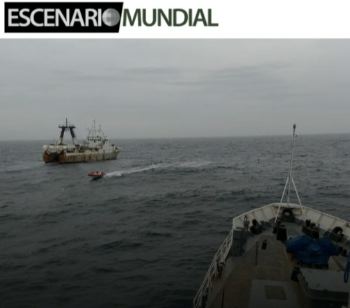

.jpg)
.jpg)
.jpg)
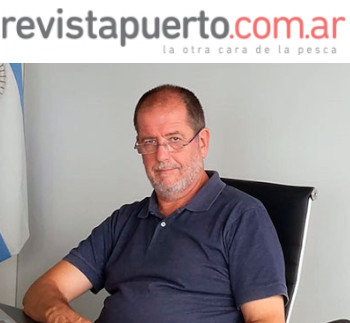
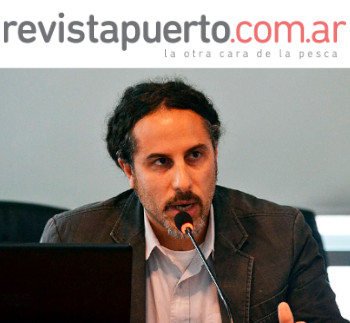
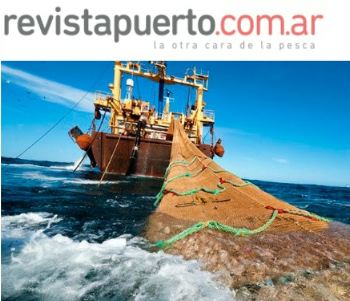

.jpg)
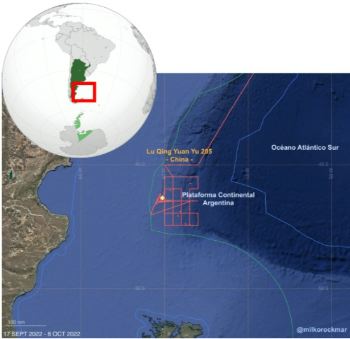
[email protected]
www.seafood.media
|



